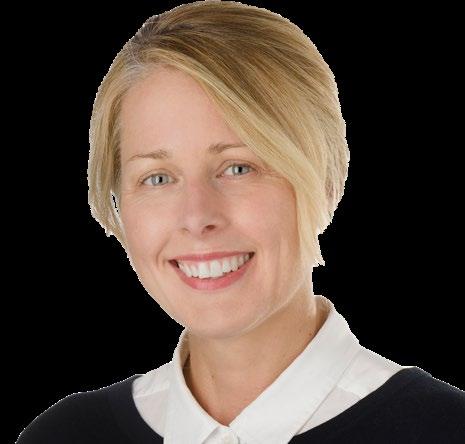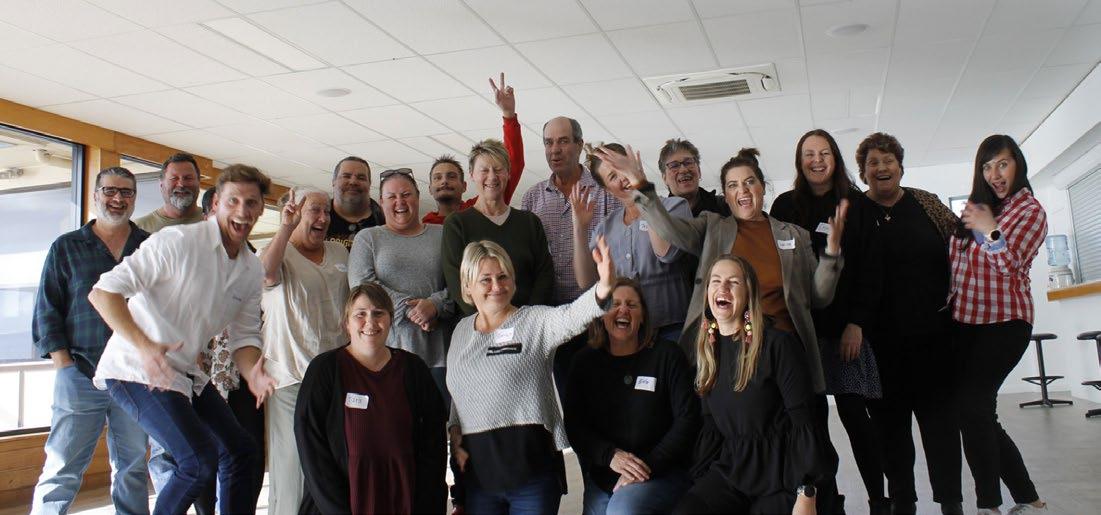
7 minute read
Let’s Talk Aged Care
A telephone support service providing independent accurate information is assisting older people navigate the road to appropriate supports and services to age well in their place of choice.
An estimated 110,000 adults, or 22 per cent of the population aged 65 years and over, reside in country South Australia. This figure is set to rise to 27 per cent over the next decade.
Advertisement
As a priority population with significant representation in country South Australia, Country SA PHN is instrumental in improving access to high quality primary healthcare for older South Australians – supporting them to age well in their place of choice.
The Royal Commission into Aged Care Quality and Safety (1 March 2021) highlighted the ongoing need for support to be available to older people to understand and navigate the aged care system. “The availability of helpful and comprehensive information is critical to ensuring older people get timely access to the care they need and to empower them to make choices about their care.” (Royal Commission into Aged Care Quality and Safety Final Report – Care, Dignity and Respect: Volume 1)
To assist older people to navigate the aged care system, connect into local services and offer broad supports relating to reablement and wellbeing Country SA PHN funds the Council on the Ageing SA (COTA SA) to provide the Let’s Talk Aged Care tele-service. Support is provided by an Ageing Well Coordinator-Country, John Moran. John researches and provides relevant information, service, and support options to callers. He also offers tools and encouragement to assist people to make informed choices about aged care and other supports to age well in their community.
This support may include aged care services, how the My Aged Care system, website and call centre works, and the processes involved, assessments, and local supports available through the Commonwealth Home Support Program, and other referrals and supports within and outside of the aged care system.
Older people can contact John via the COTA SA’s country toll free telephone number. John is further supported by existing COTA SA Management, Administrative and Communications staff and volunteers.
John maintains relationships with key agencies and networks in regional South Australia including Ageing Task Forces, Collaborative Projects, Multi-Purpose Services, Country Health Connect, Carer Gateway community centres and other aged care providers in each region.
To support the tele-service a series of online resources have also been developed for older people in response to issues and themes raised in telephone calls to the Ageing Well Coordinator–Country. They focused on simplified information that complements existing My Aged Care communication, about such issues as living independently and safely at home and in your community and how to access aged care services. Hard copy resources are also made available to older people not able to access online content.
John reported that many older people who used the teleservice were feeling distressed or overwhelmed with information. Many calls were complex and related to multiple themes.
“Callers in general have been relieved to have someone to talk to about their own particular situation,” said John.
“As part of our survey feedback, customers report that the information that I have imparted has been very useful and that they have a clearer understanding of their situation and feel more positive.
Callers report that they feel more confident to take the next steps in following up with My Aged Care to gain the services they need.”
It’s hoped that the tele-support service and the online resources will continue to be a trusted source of information and support – enabling older country South Australians to age well in their place of choice.
“Thanks, John, for the information you sent it was very informative, I feel like I have a much better understanding now, of how the aged care system works.” Gloria

The service regularly recorded high satisfaction scores from customers and positive feedback that the service is making a difference
100%
of customers who have participated in the evaluation reported satisfaction with the service
39
Let’s Talk Aged Care Case Studies
Case Study of support provided by John
Lenore called and explained that she has had some brain bleeds and Transient ischaemic attacks (TIAs) and had become confused and needed some help to organise supports. She had recently moved from Queensland where she received a Level 3 Home Care Package, is still in the process of having her belongings delivered from Queensland and had no services in place since arriving in a regional SA town. I suggested that she could get a social worker assigned temporarily. Lenore gave consent for me to speak on her behalf to investigate both health and aged care support options. I arranged an online direct referral for a social worker through the local Country Health Connect and GP Plus. I talked with Lenore further and she informed me that the brain bleeds had caused her some confusion and forgetfulness. She misses appointments, cannot remember things that occurred recently and has some trouble filling out forms. She also talked about poor balance and leg strength and that she continues to have phone consultations with her Queensland Psychiatrist about her bipolar disorder who continues to recommend that Lenore increase her social interaction. Lenore does her shopping by taxi and is in the process of arranging to receive Meals on Wheels.
After our lengthy discussion Lenore gained a little more confidence to call My Aged Care herself to give a health update and request a reassessment for aged care services. I checked in with Lenore to provide further support, to find that Lenore contacted her original ACAT assessor in Queensland directly instead of My Aged Care, as she felt more comfortable to do this, but found that she was no longer available.
With encouragement and Lenore’s consent I arranged and made a three-way conference call with Lenore and My Aged Care, and I assisted Lenore to explain her situation to the call centre representative at My Aged Care, who then made arrangements for Lenore to be ‘prioritised’ to be allocated a My Aged Care Case Manager who will work with Lenore to have a re-assessment, and then get the services and supports that meet her needs.
“I had a phone appointment with a client on the Fleurieu today and he spoke very highly of the support you have provided to him over the phone, and I would just like to thank you for following through. He said that some supports via My Aged Care and an aged care provider will be put in place within the next month or so. Thanks again.” Angela, Carer Gateway
Case Study of support provided by John
The following is a typical case study and highlights the challenges experienced by older people in some country areas, and how this service is helping older South Australians in the country to age well in place.
Mary (*name changed for this narrative) supports her husband who has dementia and Parkinson’s disease and lives in Coonalpyn. Mary told me that she received some support from a practice nurse attached to the local doctor’s surgery in Coonalpyn. The nurse was trying to assist Mary’s husband to access a level 3 Home Care Package. The only services available at the time were some council Commonwealth Home Support Programme services to put in rails in the toilet and bathroom and Country Health Connect who provide domestic assistance once a fortnight under the Commonwealth Home Support Programme.
Mary was needing much more support for her husband as he is private person of Italian heritage and likes only to be in his garden and she cannot leave him due to his risk of falls. Mary had tried to find and arrange services, but several providers informed her that Coonalpyn was too far away to get workers to travel. The main barrier for Mary was distance to providers and the two that serviced the town were at capacity. Mary sounded stressed and could not see any other options for her husband to get support. I gained Mary and her husband’s permission to contact Country Health Connect and other providers that may have serviced the area. I followed up several providers in the region over several days, mainly providers based in Murray Bridge/ Meningie and in the Southeast Country Region and all the providers contacted stated that they did not service Coonalpyn. I then discussed respite options with Mary, but this was something that her husband would not contemplate. I reassured Mary that she was on the right path in seeking to access services and I would continue to follow up other providers. I followed up other providers and again spoke with Country Health Connect who were aware of Mary and her husband’s situation. I contacted Mary again and she had now been advised by Country Health Connect that a package would be available after Christmas, and they had a worker who could provide the support. Mary was grateful for the guidance and support she received from COTA SA as she felt she was not trying to manage the situation on her own.


Alcohol and Other Drugs











